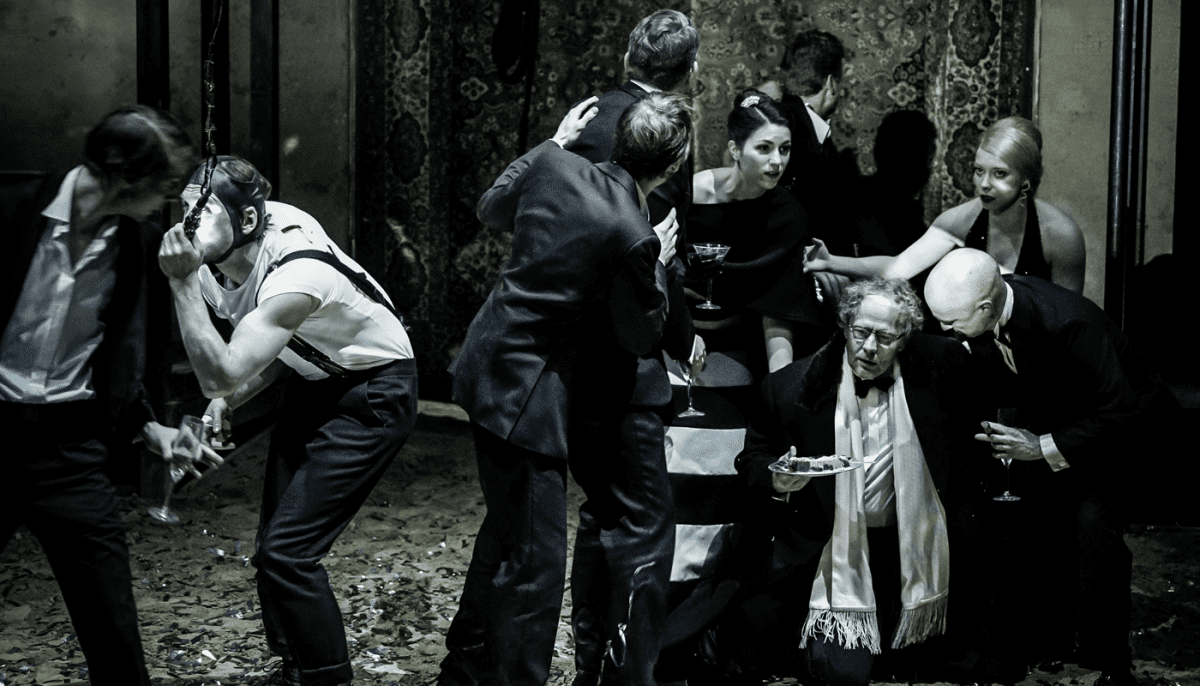Karl Marx famously opined that it is not people’s consciousness that determines their existence but their social existence that determines their consciousness.
Shakespeare understood long before Marx did how our inner thoughts are a product of the society that surrounds us – and nowhere is this more apparent than in his wronged villains: from Edmund to Shylock. Like Simone De Beauvoir’s woman, Shakespeare’s bad guys aren’t born bad guys: they become them.
Richard III is no different: shunned for having a disability, and rejected by his own brother in favour of his wife Elizabeth’s family, his crimes are a form of retaliation against his mistreatment.
Thomas Ostermeier’s production beautifully realises this.
Conflicted and self-hating, Lars Eidinger’s Richard elicits the audience’s sympathy more effectively than any other Richard I’ve seen.
Perhaps this is because we are on his side from the start.
There’s a playful energy and litheness to Eidinger’s Richard that makes him impossibly appealing, even though he plumbs the depths of depravity. He somehow manages to both amuse and appal simultaneously as he stuffs his face whilst ordering the deaths of his two young nephews.
It helps that he’s so effortlessly cool: clasping the microphone used to deliver his soliloquies like a demented Ian Curtis; thrashing around the stage in a scrum cap, y-fronts and a corset; clicking his fingers in the faces of his geriatric Edinburgh audiences as they (inexplicably) nod off.
But it’s the tenderness and the pain beneath it all that really carries us through, offering a profound insight into the reluctance of evil.
I only wish that Ostermeier’s production did more to join up the dots: to challenge us to feel the same about our contemporary Richards.
And yet still – it’s fantastic stuff.
This production does what Ostermeier does best. The acting never feels actory. The language (despite being mostly Shakespeare) rarely feels scripted. It’s theatre that never quite feels like theatre – but more like a gig: intense, sharp bursts interspersed with interactions that are effortlessly relaxed, truthful, and full of verve when needed.
Famous scenes are reimagined in the most unlikely ways. During the almost impossible seduction of Lady Anne, Richard (having recently murdered both her husband and her father) takes off his clothes and prances naked around the grieving widow.
Ostermeier takes on one of the hardest deception scenes in Shakespeare’s entire oeuvre to present in a believable way, adds a whole new layer of effrontery, and somehow manages to make it work: Richard, more mocking and provocative than ever, is also at his most vulnerable and convincing.
It’s a simple (though improbable) touch, but is transforms the scene.
Another example: just after being told that the princes in the tower have been murdered, Richard nearly vomits, before covering his entire face in the pudding he’s eating. It remains on his face for the rest of the show, like a kind of death mask. It shouldn’t work, but it really does: adding layers of pathos and farce to everything that follows.
Richard III is further proof of just how exceptional Ostermeier’s work is. Few people make shows that are concurrently so truthful and so inventive. And few are able to transform classic texts so that they become so achingly relevant and coherent to a contemporary audience (even if, in this instance, they are mostly over the age of 50).

